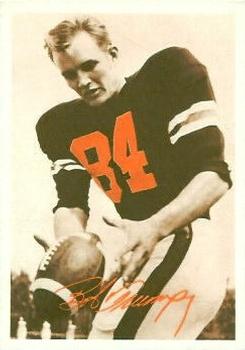Cincinnati Bengals
The Cincinnati Bengals are a professional American football team based in Cincinnati, Ohio. They are a member of the American Football Conference (AFC) North division in the National Football League (NFL). The team was established in 1967 by former Cleveland Browns head coach Paul Brown, who was also the team's first head coach.
History[edit | edit source]
The Cincinnati Bengals were founded in 1967 as a member of the American Football League (AFL) by Paul Brown. The team began play in the 1968 season and joined the NFL in 1970 as part of the AFL-NFL merger. The Bengals' early years were marked by moderate success, with the team reaching the playoffs in 1970, 1973, and 1975.
1980s Success[edit | edit source]
The Bengals experienced significant success in the 1980s, reaching the Super Bowl twice. In the 1981 season, led by quarterback Ken Anderson and head coach Forrest Gregg, the Bengals reached Super Bowl XVI but were defeated by the San Francisco 49ers. The team returned to the Super Bowl in the 1988 season under head coach Sam Wyche and quarterback Boomer Esiason, but again lost to the 49ers in Super Bowl XXIII.
1990s Struggles[edit | edit source]
The 1990s were a challenging decade for the Bengals, marked by a lack of playoff appearances and several losing seasons. The team struggled to find consistent success on the field, leading to frequent changes in coaching staff and management.
2000s Resurgence[edit | edit source]
The Bengals began to show signs of improvement in the 2000s under head coach Marvin Lewis, who took over in 2003. The team won the AFC North division title in 2005, their first division title since 1990, and made several playoff appearances throughout the decade.
Recent Years[edit | edit source]
In recent years, the Bengals have continued to build a competitive team. Under head coach Zac Taylor, the Bengals reached the Super Bowl for the third time in the 2021 season, but were defeated by the Los Angeles Rams in Super Bowl LVI.
Stadium[edit | edit source]
The Bengals play their home games at Paycor Stadium, located in downtown Cincinnati. The stadium, originally named Paul Brown Stadium, opened in 2000 and has a seating capacity of over 65,000.
Rivalries[edit | edit source]
The Bengals have several notable rivalries, particularly with other teams in the AFC North. Their primary rivals include the Pittsburgh Steelers, Cleveland Browns, and Baltimore Ravens. These rivalries are characterized by intense and competitive matchups.
Notable Players[edit | edit source]
Over the years, the Bengals have had several notable players, including:
- Ken Anderson - Quarterback, 1971-1986
- Boomer Esiason - Quarterback, 1984-1992, 1997
- Chad Johnson (also known as Chad Ochocinco) - Wide Receiver, 2001-2010
- A.J. Green - Wide Receiver, 2011-2020
- Joe Burrow - Quarterback, 2020-present
Also see[edit | edit source]
- American Football Conference
- National Football League
- Super Bowl
- Cleveland Browns
- Pittsburgh Steelers
- Baltimore Ravens
| Cincinnati Bengals | ||||||||||
|---|---|---|---|---|---|---|---|---|---|---|
|
Search WikiMD
Ad.Tired of being Overweight? Try W8MD's NYC physician weight loss.
Semaglutide (Ozempic / Wegovy and Tirzepatide (Mounjaro / Zepbound) available. Call 718 946 5500.
Advertise on WikiMD
|
WikiMD's Wellness Encyclopedia |
| Let Food Be Thy Medicine Medicine Thy Food - Hippocrates |
Translate this page: - East Asian
中文,
日本,
한국어,
South Asian
हिन्दी,
தமிழ்,
తెలుగు,
Urdu,
ಕನ್ನಡ,
Southeast Asian
Indonesian,
Vietnamese,
Thai,
မြန်မာဘာသာ,
বাংলা
European
español,
Deutsch,
français,
Greek,
português do Brasil,
polski,
română,
русский,
Nederlands,
norsk,
svenska,
suomi,
Italian
Middle Eastern & African
عربى,
Turkish,
Persian,
Hebrew,
Afrikaans,
isiZulu,
Kiswahili,
Other
Bulgarian,
Hungarian,
Czech,
Swedish,
മലയാളം,
मराठी,
ਪੰਜਾਬੀ,
ગુજરાતી,
Portuguese,
Ukrainian
Medical Disclaimer: WikiMD is not a substitute for professional medical advice. The information on WikiMD is provided as an information resource only, may be incorrect, outdated or misleading, and is not to be used or relied on for any diagnostic or treatment purposes. Please consult your health care provider before making any healthcare decisions or for guidance about a specific medical condition. WikiMD expressly disclaims responsibility, and shall have no liability, for any damages, loss, injury, or liability whatsoever suffered as a result of your reliance on the information contained in this site. By visiting this site you agree to the foregoing terms and conditions, which may from time to time be changed or supplemented by WikiMD. If you do not agree to the foregoing terms and conditions, you should not enter or use this site. See full disclaimer.
Credits:Most images are courtesy of Wikimedia commons, and templates, categories Wikipedia, licensed under CC BY SA or similar.
Contributors: Prab R. Tumpati, MD




